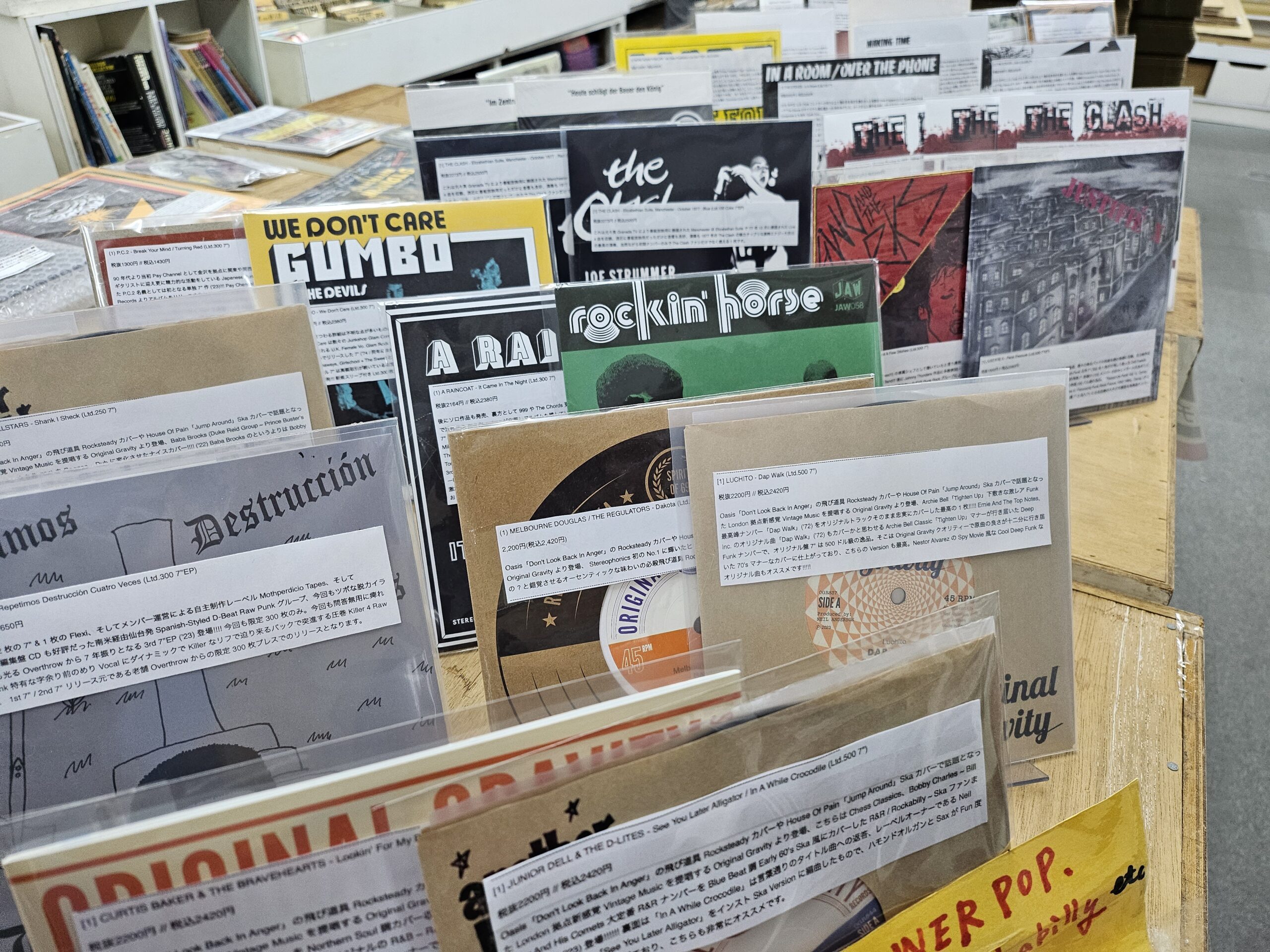This is part one of a two-part series about record stores in Japan. Be sure to check out part two about Osaka’s Punk and Destroy & Philly’s Sit and Spin Records!
Traveling in Japan wasn’t simply being a kid in a candy store. It was like being a kid being in 17 candy stores simultaneously, with each candy store leading to another candy store that’s even better than the last. From the food to the entertainment districts to the nightlife and back to the food again, I arrived in Tokyo with a list almost as long as the flight time from Philadelphia.
At the top of my list: record shops. Japan boasts over 6,000 record shops, with a population of over 125 million people. For comparison, the USA has just over 9,000 record stores, and our population is nearly triple that of Japan. Statistics aside, I knew going in that Japan had a vibrant vinyl scene, with countless small specialty record shops all over the major cities and beyond. I was primed and ready to avail myself of what they had to offer.
About half of my trip was localized largely around Osaka, about 320 miles away from Tokyo. It would take you over six hours to drive, but the Shinkansen (bullet train) can get you there in as little as two and half hours. If Tokyo is a little too buttoned-down and regimented for you (a common complaint from both locals and ex-pats), Osaka has a little more of that chaotic-neutral energy you might be looking for. Gritty would be at home in Osaka – and quickly adopted as their mascot, too.
Osaka may be a smaller city than Tokyo, but it’s still massive by US standards. I was staying in Nipponbashi, with the famous Den-Den Town right outside my front door bustling with shops specializing in anime, toys, video games, DVDs and manga. And just to the north is the Amerikamura, a hip-as-can-be neighborhood centered around Sankakukoen Triangle Park.
This is an epicenter of vintage clothing boutiques, guitar shops, coffee roasters, and hip-hop style. It is also a major hub for record collectors, and my map of that neighborhood alone was starred with over a dozen shops. I had my work cut out for me.
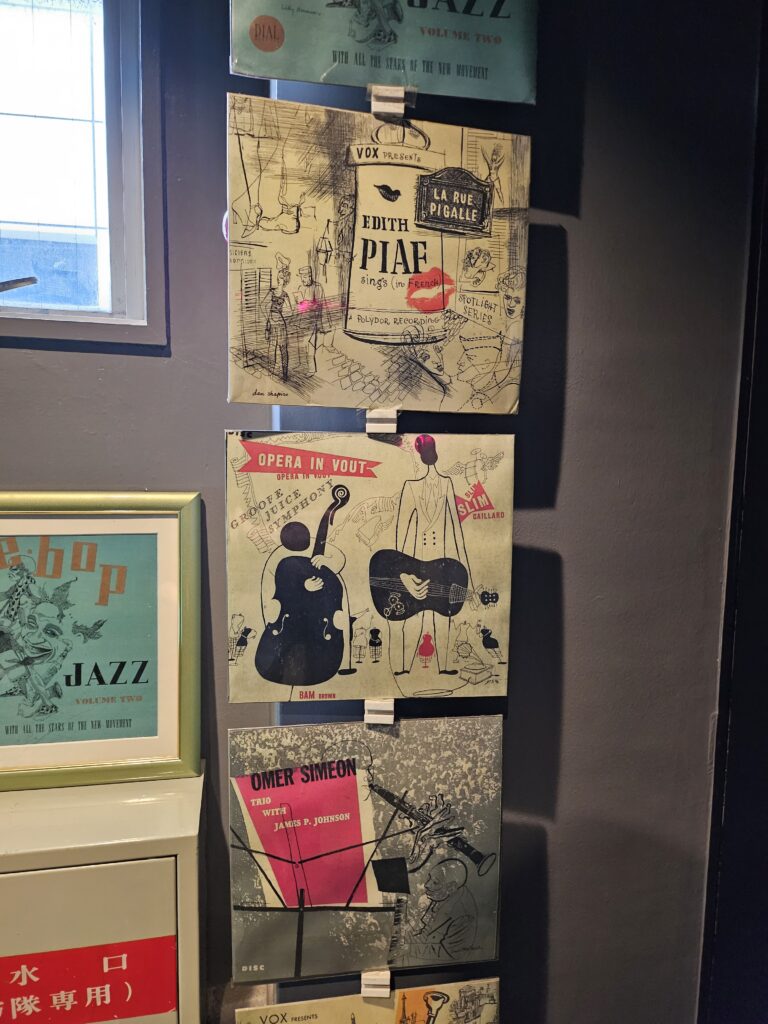
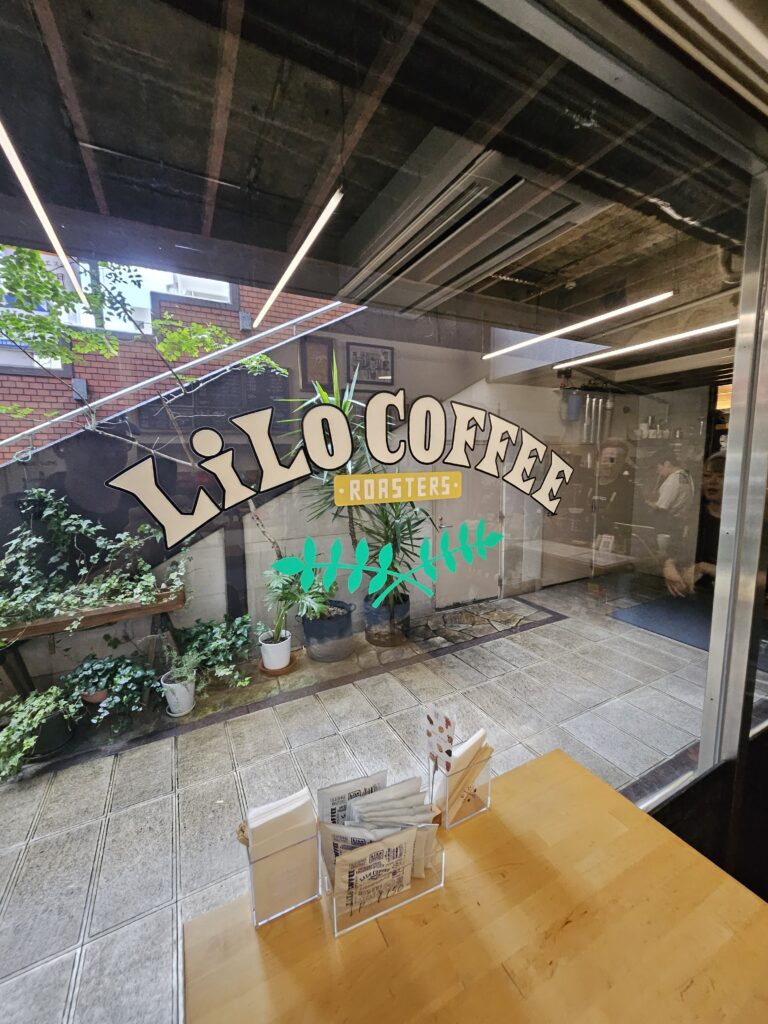
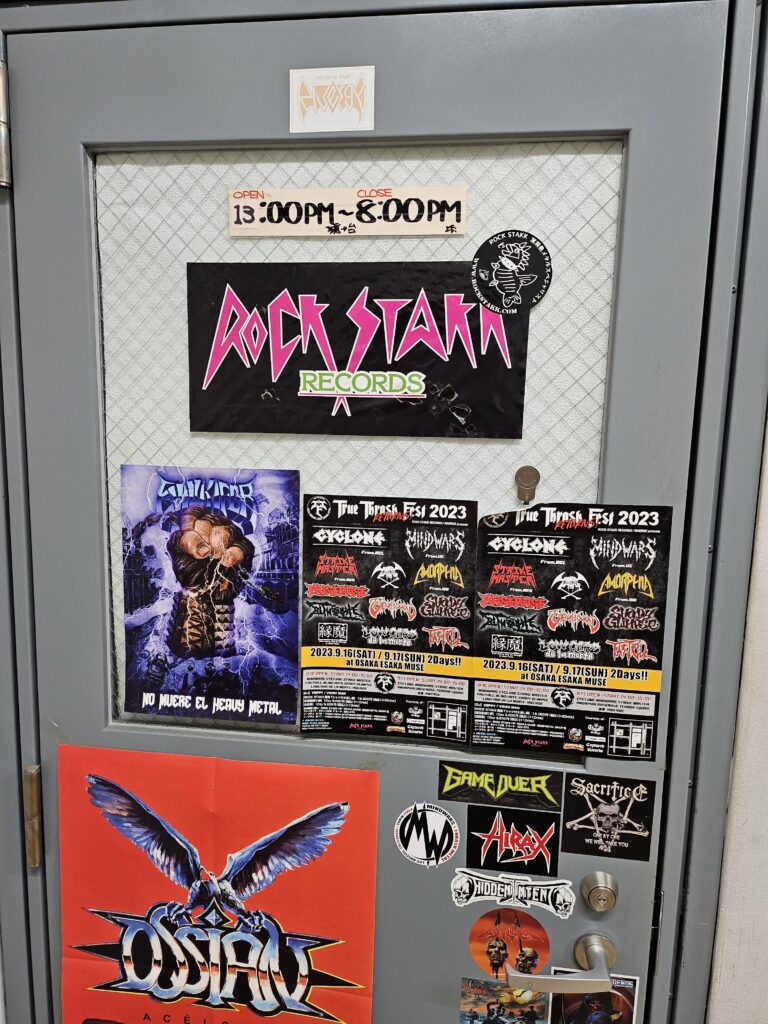
Would I recommend hitting seven record stores in just about 4 hours? It’s hard to say. Short answer: no. By shop number 4, you’re pretty overwhelmed, probably hungry, and need to gather yourself, and maybe take a quick look at your pocket of receipts to see what you’ve gotten yourself into. But how many times am I going to be in Osaka in the foreseeable future? Exactly. So I pressed on.
I checked out shops like Time Bomb (largely punk and Western rock), Groovenut (tons of soul, jazz and world), and Rock Stakk (metal and hard rock). The browsing was top notch, and the cataloging and organization of even the smaller shops were impressive. Everything labeled and in its place, making it easy to cover a lot of ground in a short time. I didn’t buy much at these shops, despite the many, many great finds. And I was beginning to get “rock fatigued” – I was tired of just running into big name Western rock n’ roll like Led Zeppelin, Rolling Stones, Springsteen, etc.
I pushed forward, stopping for a quick espresso at LiLo Coffee Roasters, which would be at home in the hippest neighborhood of any American city. “I need to find something cool and unique,” I thought. I wanted to come home with some records that I wouldn’t be able to find in the US, not necessarily because of their rarity or obscurity, but because they’re just not in demand back home. Everything I’d seen so far was great, but I wanted something special.
And I found it. I climbed the stairs to the 5th floor of a building only to find that Rootdown Records, one of the shops I picked out long before I ever set foot in Japan, had closed. But I remembered seeing another shop on the second floor as I ascended, so back downstairs I went, figuring I’d try and salvage the trip as best I could.
I mean this with absolutely no shade on Rootdown: I’m glad they happened to be closed. I would have missed the crown jewel in all of my record shopping: Newtone Records. I stepped in and it just felt right. There was a very chill vibe there – largely because I was the only one in the shop, but also due to the low-ish volume of some electronic groove music, and the general openness of the shop itself. It was small (certainly tiny by American standards), but it didn’t feel so small. It’s amazing what light colors and some natural light can do.
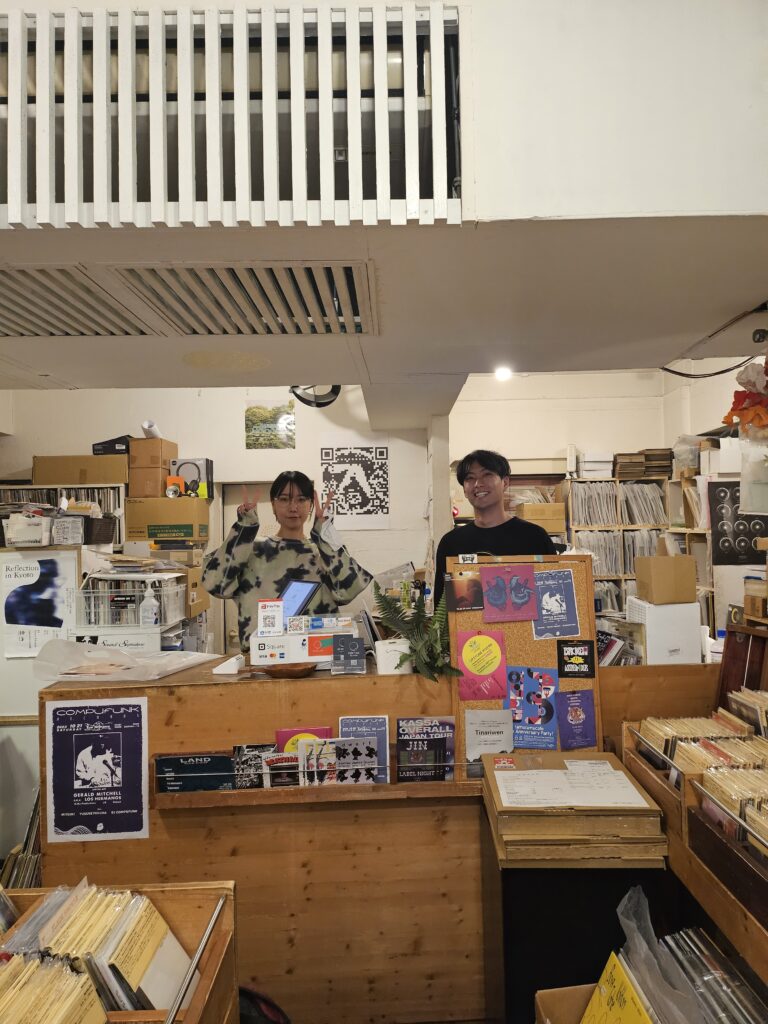
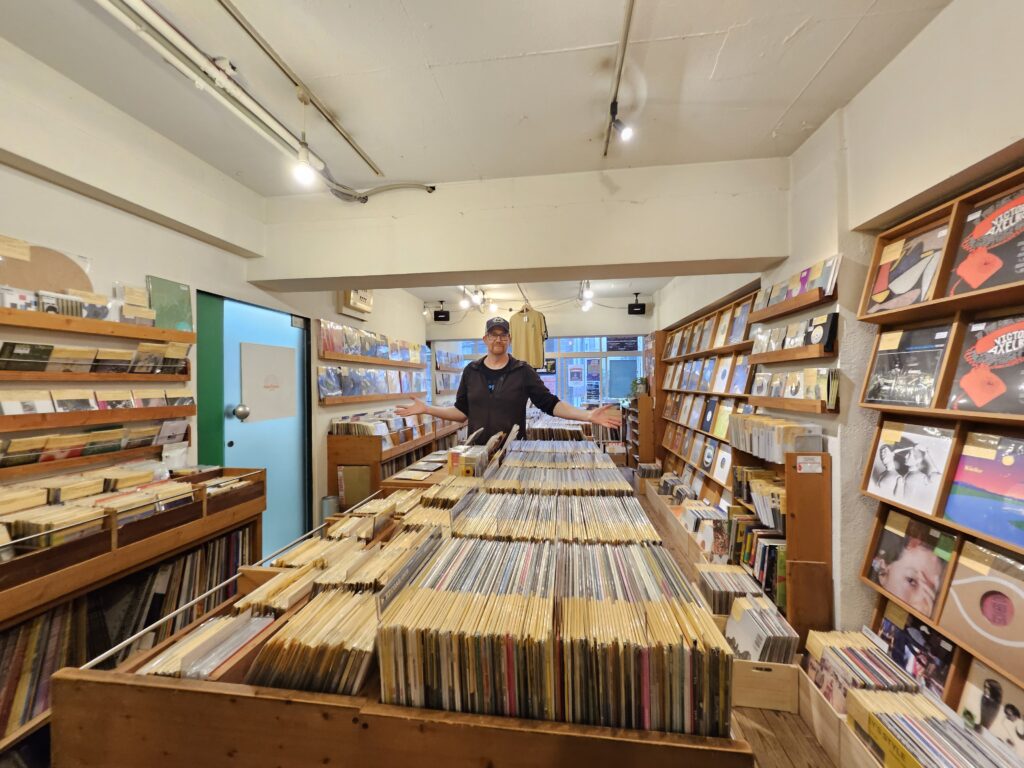
I met Aya at the counter. While she may not own the store, you wouldn’t be far off thinking so. Both Aya and her coworker, Ashikaga, have been working there for a couple of years. Ashikaga was a good few years younger than Aya and myself (both in our 40s). She spoke a bit of English (certainly more than I spoke Japanese), and we relied largely on Google Translate to communicate, with me just blurting out names of artists that I liked. We immediately discovered that we were both huge Native Tongues hip-hop fans (A Tribe Called Quest, De La Soul, Queen Latifah), and that while we both appreciate louder, more aggressive electronic, we both gravitate towards the more loungey vibe of groups like Cornelius and Combustible Edison. And I was delighted to learn that she, like me, was a big fan of jazz pianist Bill Evans.
Throughout my hour-long stay at the shop, she would bring me records she thought of as I browsed. In the back of the shop is an iMac, and on that iMac are samples of nearly every record, new or used, that they have in the shop. What an incredibly helpful tool! Specializing largely in electronic, dance, and experimental records, Newtone has tons of Western and world records as well. If your tastes are in the direction of, say, Bonobo, Massive Attack, Portishead, Four Tet, etc., you will be at home here.
Aya was kind enough to answer a few questions for me over email after I got home.
What is the first record you remember buying with your own money?
I’m from the CD generation, so the first CD I bought with my pocket money when I was a kid was Mariah Carey’s Music Box. It’s been a while since I bought a [vinyl] record, but I can’t remember. I was interested in jazz and rare grooves and started buying records, so I guess it was Sun Ra, Chet Baker, Bill Evans.
When did Newtone records first open? Was it always at this location?
It opened in July 2003. This year marks the 20th anniversary. The store location remains the same. [Address is 1-10-33 Nishi-Shinsaibashi, Chuo-ku, Osaka 542-0086 Kita Sumiya Building 2F]
Did Newtone always specialize in electronic and experimental music?
Since the store first opened, we have mainly imported 12″ vinyl, as well as alternative house, disco, crossover sounds, techno, bass music, various electronic music [styles], and experimental music, jazz, soul, etc. [We specialize in] introducing unique dance music from around the world.
Is there an active community of listeners/fans of the records you sell? Do you get many Westerners to the store?
It’s difficult to pick just one community, but all Newtone buyers, including the owner, are active DJs with a high level of trust in Japan, so many of our customers include Japanese DJs and musicians. It is also attractive that some of the great buyers who worked at Newtone in the past are now independent and running a shop in the same Osaka area.
Could you name and describe a few Japanese artists of any genre/style that you think more Westerners should be aware of?
EM Records is an independent record label founded in 1998 and based in the southern part of Osaka, Japan. With a focus on Asia, there are many unique releases that you won’t find anywhere else, including experimental music, electronic music, jazz, blues, classical music, rock, reggae, dance, and ethnic music. Japanese regional folk songs (Kizaki Ondo), and a group that pioneered nerdcore, drum & bass, jungle, rave, etc. in Osaka in the 90s (Psych Outs) and other valuable and cool sound sources that even I, as a Japanese person, would not have known about. Everything is really cool, including the artwork.
What’s your favorite recent record that has come into the store?
These are my 5 favorites that have arrived recently.
- Kukan Gendai – Tracks
- Honda People – This People
- Shiftyman’s Day – Mangold Maserati
- Shira Small – The Line Of Time And The Plane Of Now [originally released in 1974 and recorded in Newtown, PA]
- Mankunku Quartet – Yakhal’ Inkomo
Aya was also kind enough to hand me the Osaka Record Map, a fold out brochure that had the locations and descriptions of about two dozen different shops in the area, complete with handy neighborhood maps. It was just another example of the thought that goes into nearly everything in Japan.
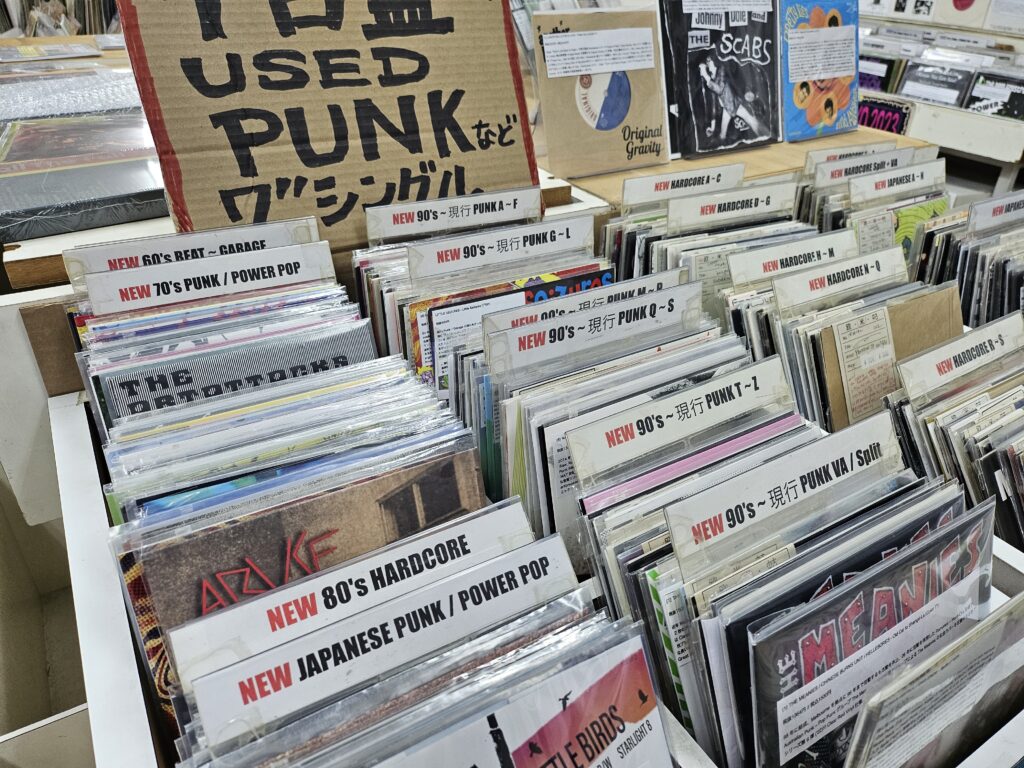
But what of Tokyo? My travels there took me to a few highly-trafficked shopping areas, particularly in Shinjuku and Shibuya, two neighboring wards on the west side of the city (Tokyo is made up of 23 wards, all with their own elected mayors). By our standards, just Shinjuku and Shibuya together would be the size of a standard American city.
I got off the subway late in the morning on a Saturday, so the place was teeming with young people, tourists, and locals all engaging in the universal Saturday activity: shopping. I had to get out onto the street and start exploring some of the smaller, independent shops in the district. I headed up five flights of stairs in an ordinary looking building to find myself in NAT Records. Specializing in punk, hardcore, garage, psych, pub-rock, power-pop and ska, it was definitely a must-shop for me.
The owner, Ethan, was at the register, and spoke excellent English (something I found to be common but not a given in a lot of the record stores), so we were able to chat about the shop and the records. He told me that he sees a good mix of both Westerners like myself and young Japanese folk, and that he does steady business shipping out rare and collectible records to the international market. I ended up picking up a couple of obscure Elvis Costello 45s, an old dBs single, and a few 2-Tone ska records.
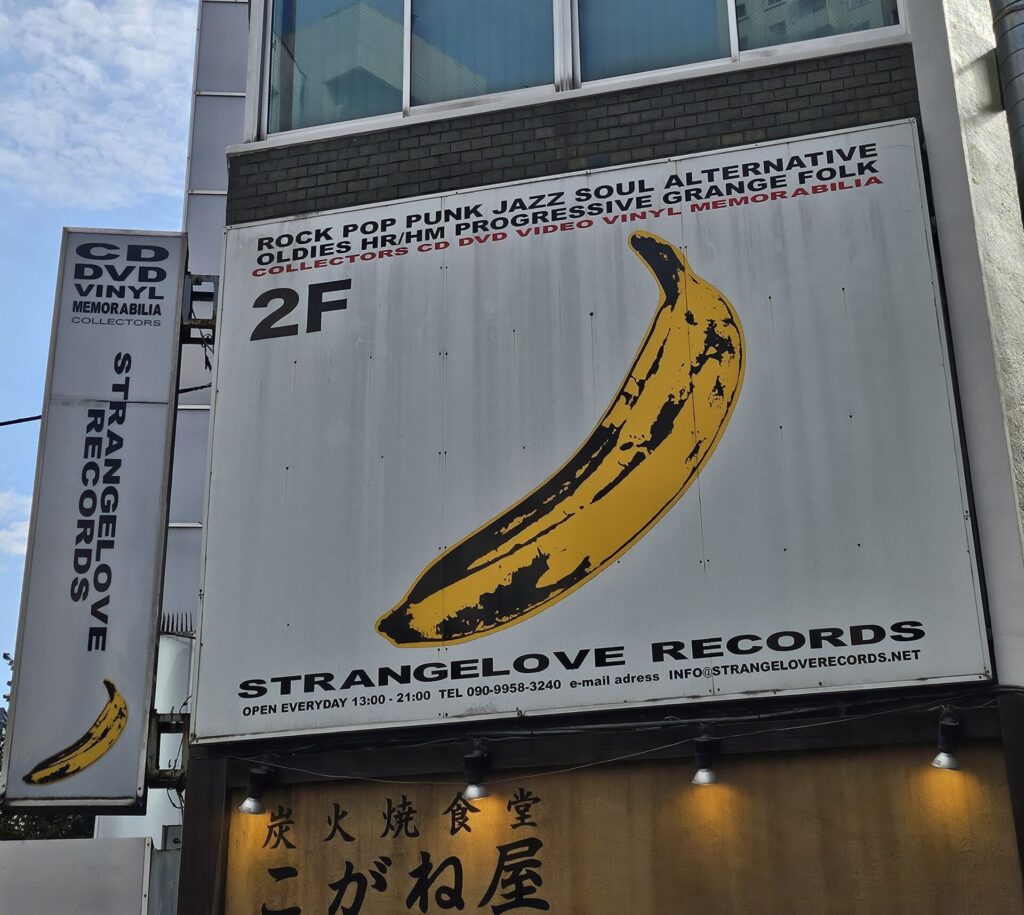
I didn’t get far away from NAT before I looked up and saw the ever familiar Andy Warhol banana from The Velvet Underground and Nico beckoning me to Strangelove Records, just a couple of blocks away. Up on the second floor (everything’s up in Tokyo), the shop boasted a great selection of the big Western hitters: Beatles, Bowie, Prince, Queen, The Carpenters, and a pretty massive Kylie Minogue collection. A few Tedeschi Trucks records were displayed prominently – the band’s upcoming three night stand at the Tokyo Dome City Hall theater was the following week. I managed to get out of the shop without buying anything, miraculously.
You can’t talk about record shopping in Tokyo without talking about Disk Union. Disk Union began as a classical music record store, and branched out to include all genres. The chain boasts over 50 stores across Japan (giving Tower a bit of a run), and the Shinjuku store occupies 8 entire floors of the Yamada Building. I walked out with an old glam rock LP and a Germs tribute compilation.
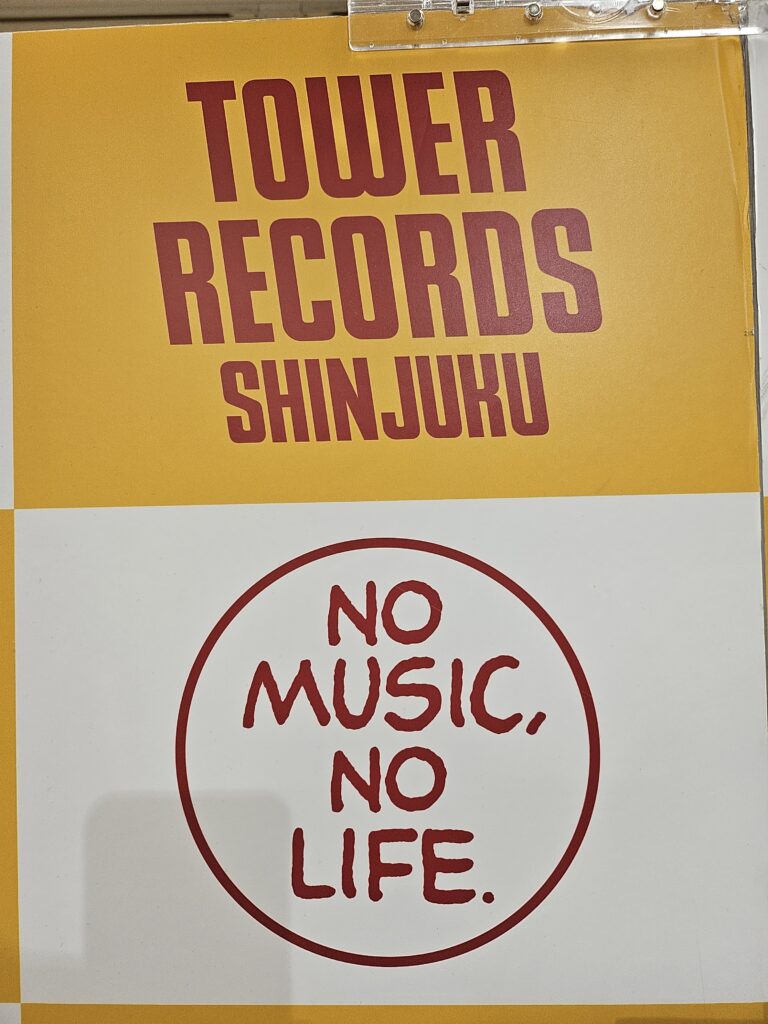
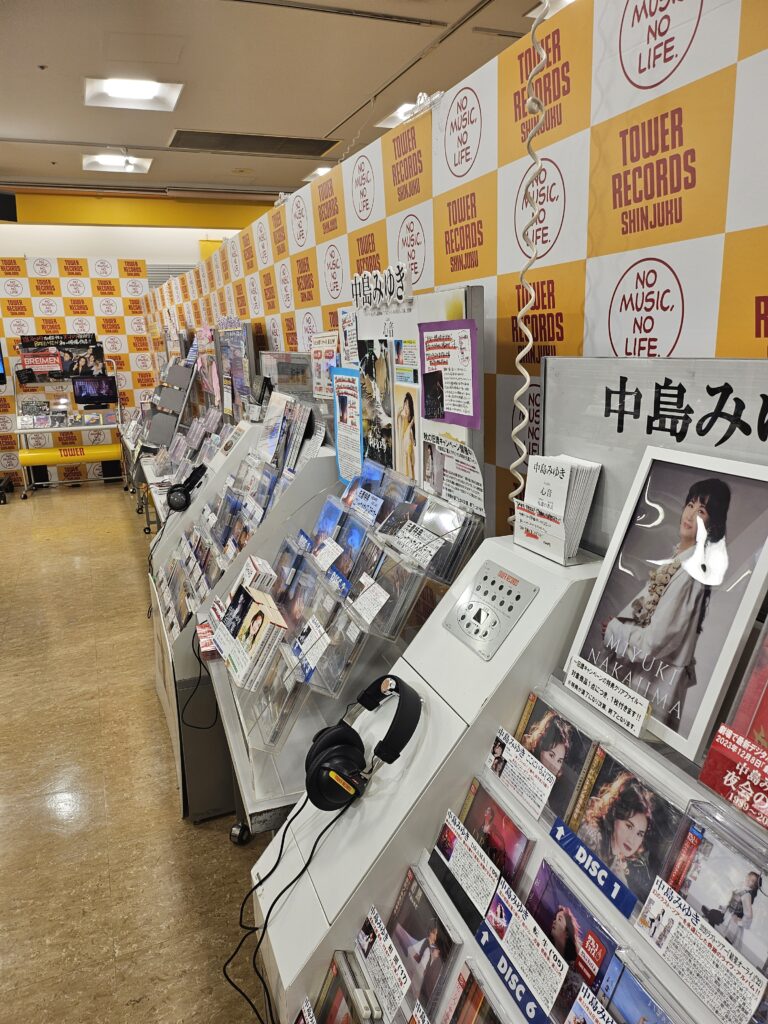
And what of Tower Records in Shinjuku? Of the 6,000 record stores in Japan, 85 of them are Tower Records. Stepping in was an absolute rush of nostalgia and the pang of something lost. It was like stepping into a much larger version of the old South Street Tower Records, or the one on Broad and Chestnut, both of which no longer exist in Philadelphia. The store sits up on the 10th and 11th floors of a busy shopping mall, and clocks in at 521 square meters (5608 square feet), a size reserved solely (and rarely) for large chains in Japan, where space of all kinds is at a premium. Amidst the rows and racks were the CD listening stations of my formative years, and I definitely spent some time just popping on headphones and listening to whatever the selections were, which ranged from reissues of American and European classic rock, new Japanese rock and pop, and even some ambient and experimental mixed in as well.
The place was full of people of all ages, doing their Saturday record shopping thing. I flipped through the new 7” section, next to a couple of young Japanese men who were geeking out about a handful of new Dilla compilations in the stacks. Some things, as I would continue to be reminded of on my trip, are universal.
There are, of course, countless blog posts and travel guides on record shopping in Tokyo alone. My advice? Pick a neighborhood like Shinjuku, Shibuya, or Shimokitazawa to the west – places with a high density of shops – and go from there. But wherever you go, you will find small specialty shops. Just be ready to walk up some stairs.
I now spend my days and nights pining for the narrow streets of Osaka, the crowded shopping districts of Tokyo, and all the amazing record stores I didn’t get to. Pack an extra bag, make your list, and be ready for a record shopping trip that will knock your socks off. ありがと ございます!

